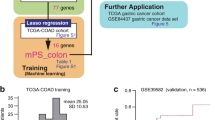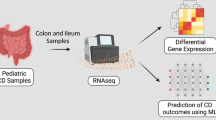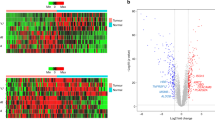Abstract
We have assessed the possibility to build a prognosis predictor (PP), based on non-neoplastic mucosa microarray gene expression measures, for stage II colon cancer patients. Non-neoplastic colonic mucosa mRNA samples from 24 patients (10 with a metachronous metastasis, 14 with no recurrence) were profiled using the Affymetrix HGU133A GeneChip. Patients were repeatedly and randomly divided into 1000 training sets (TSs) of size 16 and validation sets (VS) of size 8. For each TS/VS split, a 70-gene PP, identified on the TS by selecting the 70 most differentially expressed genes and applying diagonal linear discriminant analysis, was used to predict the prognoses of VS patients. Mean prognosis prediction performances of the 70-gene PP were 81.8% for accuracy, 73.0% for sensitivity and 87.1% for specificity. Informative genes suggested branching signal-transduction pathways with possible extensive networks between individual pathways. They also included genes coding for proteins involved in immune surveillance. In conclusion, our study suggests that one can build an accurate PP for stage II colon cancer patients, based on non-neoplastic mucosa microarray gene expression measures.
This is a preview of subscription content, access via your institution
Access options
Subscribe to this journal
Receive 50 print issues and online access
$259.00 per year
only $5.18 per issue
Buy this article
- Purchase on Springer Link
- Instant access to full article PDF
Prices may be subject to local taxes which are calculated during checkout
Similar content being viewed by others
Accession codes
Accessions
GenBank/EMBL/DDBJ
References
Alon U, Barkai N, Notterman DA, Gish K, Ybarra S, Mack D et al. (1999). Broad patterns of gene expression revealed by clustering analysis of tumor and normal colon tissues probed by oligonucleotide arrays. Proc Natl Acad Sci 96: 6745–6750.
Arango D, Laiho P, Kokko A, Alhopuro P, Sammalkorpi H, Salovaara R et al. (2005). Gene-expression profiling predicts recurrence in Dukes' C colorectal cancer. Gastroenterology 129: 874–884.
Barbier M, Attoub S, Calvez R, Laffargue M, Jarry A, Mareel M et al. (2001). Tumour biology. Weakening link to colorectal cancer? Nature 413: 796.
Barrier A, Boelle PY, Roser F, Gregg J, Tse C, Brault D et al. (2006). Stage II colon cancer prognosis prediction by tumor gene expression profiling. J Clin Oncol 24: (in press).
Barrier A, Lemoine A, Boelle PY, Tse C, Brault D, Chiappini F et al. (2005). Colon cancer prognosis prediction by gene expression profiling. Oncogene 24: 6155–6164.
Benson III AB, Schrag D, Somerfield MR, Cohen AM, Figueredo AT, Flynn PJ et al. (2004). American Society of Clinical Oncology recommendations on adjuvant chemotherapy for stage II colon cancer. J Clin Oncol 22: 3408–3419.
Bernards R, Weinberg RA . (2002). A progression puzzle. Nature 418: 823–824.
Bolstad BM, Irizarry RA, Gautier L, Wu Z . (2005). Bioinformatics and Computational Biology Solutions Using R and Bioconductor: Preprocessing High-density Oligonucleotide Arrays. Gentleman R, Carey VJ, Huber W, Irizarry RA, Dudoit S (eds). Springer: New York, NY. pp. 13–32.
Dudoit S, Fridlyand J . (2003). Classification in Microarray experiments. Statistical Analysis of Gene Expression MicroArray Data. In: Speed T (ed). Chapman & Hall/CRC: Boca Raton, FL, pp. 93–158.
Dudoit S, Fridlyand J, Speed TP . (2002). Comparison of discrimination methods for the classification of tumors using gene expression data. J Am Statist Assoc 97: 77–87.
Dudoit S, van der Laan MJ . (2005). Asymptotics of cross-validation risk estimation in estimator selection and performance assessment. Statist Methodol 2: 131–154.
Figueredo A, Charette ML, Maroun J, Brouwers MC, Zuraw L . (2004). Adjuvant therapy for stage II colon cancer. A systematic review from the Cancer Care Ontario Program in evidence-based care's gastrointestinal cancer disease site group. J Clin Oncol 22: 3395–3407.
Hashida H, Takabayashi A, Tokuhara T, Hattori N, Taki T, Hasegawa H et al. (2003). Clinical significance of transmembrane 4 superfamily in colon cancer. Br J Cancer 89: 158–167.
Kanekura T, Chen X, Kanzaki T . (2002). Basigin (CD147) is expressed on melanoma cells and induces tumor cell invasion by stimulating production of matrix metalloproteinases by fibroblasts. Int J Cancer 99: 520–528.
Kitahara O, Furukawa Y, Tanaka TC, Ono K, Yanagawa R, Nita ME et al. (2002). Alterations of gene expression during colorectal carcinogenesis revealed by cDNA microarrays after laser-capture microdissection of tumor tissues and normal epithelia. Cancer Res 61: 3544–3549.
Kristiansen G, Sammar M, Altevogt P . (2004). Tumour biological aspects of CD24, a mucin-like adhesion molecule. J Mol Histol 35: 255–262.
Li O, Zheng P, Liu Y . (2004). CD24 expression on T cells is required for optimal T cell proliferation in lymphopenic host. J Exp Med 200: 1083–1089.
Mazzocca A, Carloni V, Sciammetta S, Cordella C, Pantaleo P, Caldini A et al. (2002). Expression of transmembrane 4 superfamily (TM4SF) proteins and their role in hepatic stellate cell motility and wound healing migration. J Hepatol 37: 322–330.
Mueller MM, Fusenig NE . (2004). Friends or foes – bipolar effects of the tumour stroma in cancer. Nat Rev Cancer 4: 839–849.
Michiels S, Koscielny S, Hill C . (2005). Prediction of cancer outcome with microarrays. A multiple random validation strategy. Lancet 365: 488–492.
Notterman DA, Alon U, Sierk AJ, Levine AJ . (2002). Transcriptional gene expression profiles of colorectal adenoma, adenocarcinoma, and normal tissue examined by oligonucleotide arrays. Cancer Res 61: 3124–3130.
Pages F, Berger A, Camus M, Sanchez-Cabo F, Costes A, Molidor R et al. (2005). Effector memory T cells, early metastasis, and survival in colorectal cancer. N Engl J Med 353: 2654–2666.
Ramaswamy S, Ross KN, Lander ES, Golub TR . (2003). A molecular signature of metastasis in primary solid tumors. Nat Genet 33: 49–54.
Schindelmann S, Windisch J, Grundmann R, Kreienberg R, Zeillinger R, Deissler H et al. (2002). Expression profiling of mammary carcinoma cell lines: correlation of in vitro invasiveness with expression of CD24. Tumour Biol 23: 139–145.
Tanaka T, Akatsuka S, Ozeki M, Shirase T, Hiai H, Toyokuni S et al. (2004). Redox regulation of annexin 2 and its implications for oxidative stress-induced renal carcinogenesis and metastasis. Oncogene 23: 3980–3989.
Wang Y, Jatkoe T, Zhang Y, Mutch MG, Talantov D, Jiang J et al. (2004). Gene expression profiles and molecular markers to predict recurrence of Dukes' B colon cancer. J Clin Oncol 27: 1564–1571.
Zou TT, Selaru FM, Xu Y, Shustova V, Yin J, Mori Y et al. (2002). Application of cDNA microarrays to generate a molecular taxonomy capable of distinguishing between colon cancer and normal colon. Oncogene 21: 4855–4862.
Acknowledgements
The first author (Alain Barrier) has received a grant of the Ligue Nationale Contre le Cancer. The work has been supported by the California Institute for Quantitative Biomedical Research (QB3), UC Berkeley.
Author information
Authors and Affiliations
Corresponding author
Additional information
Supplementary Information accompanies the paper on the Oncogene website (http://www.nature.com/onc).
Supplementary information
Rights and permissions
About this article
Cite this article
Barrier, A., Roser, F., Boëlle, PY. et al. Prognosis of stage II colon cancer by non-neoplastic mucosa gene expression profiling. Oncogene 26, 2642–2648 (2007). https://doi.org/10.1038/sj.onc.1210060
Received:
Revised:
Accepted:
Published:
Issue Date:
DOI: https://doi.org/10.1038/sj.onc.1210060
Keywords
This article is cited by
-
Evaluation of frozen tissue-derived prognostic gene expression signatures in FFPE colorectal cancer samples
Scientific Reports (2016)
-
Activation of the PI3K/AKT pathway correlates with prognosis in stage II colon cancer
British Journal of Cancer (2014)
-
Prognostic impact of genomic instability in colorectal cancer
British Journal of Cancer (2014)
-
Specific activity of cyclin-dependent kinase I is a new potential predictor of tumour recurrence in stage II colon cancer
British Journal of Cancer (2012)
-
Guidelines for biomarker testing in colorectal carcinoma (CRC): a national consensus of the Spanish Society of Pathology (SEAP) and the Spanish Society of Medical Oncology (SEOM)
Clinical and Translational Oncology (2012)



